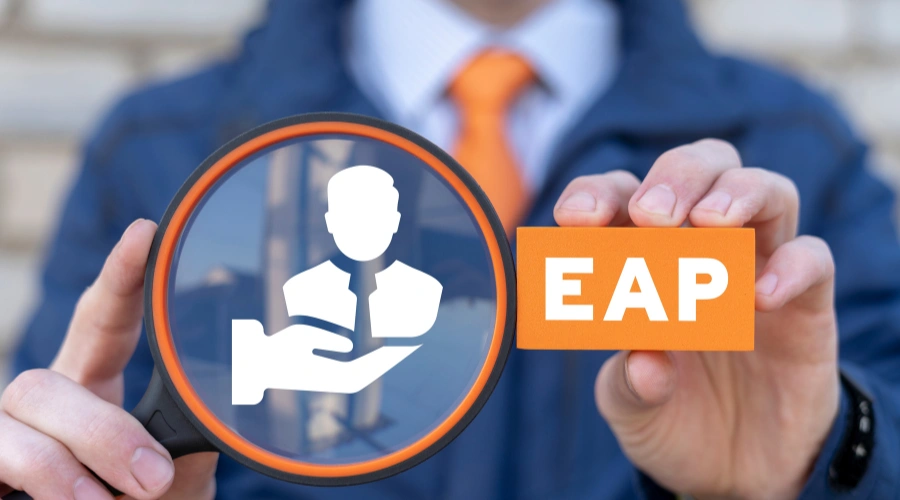Using Your Employee Assistance Program for Substance Abuse Treatment
Balancing your career and personal life isn’t easy, especially if you’re struggling with substance abuse. Many employees are at a loss when faced with these issues. Fortunately, most workplaces already have programs in place to help.
An Employee Assistance Program (EAP) connects you with short-term counseling, drug and alcohol addiction treatment services, and whatever else you may need to overcome these struggles. They are also confidential.
But what does EAP rehab coverage actually, well, cover?
In many cases, EAPs can support assistance for addiction and dual diagnosis treatment, though the levels of care covered and exact benefits vary widely. This is why we invite you to keep reading, and to get expert guidance and details about EAP services and how to use them in our latest resource from South Shores Recovery.
What is an Employee Assistance Program (EAP)?

An Employee Assistance Program (EAP) is a workplace benefit that supports employees facing certain challenges, including addiction. California EAPs provide free short-term counseling, mental health support, and referrals to outside services like addiction treatment centers.
By making it easier for employees to address problems sooner, change can happen before problems harm work performance, relationships, and overall well-being.
If you’re struggling with alcohol or drug use, an EAP is a stepping stone toward recovery. EAP benefits are also confidential, making it easier for employees to connect with professional treatment options without fear of judgment from their employer.
Is EAP a Type of Insurance Coverage?
Your EAP provider is not insurance. It’s a type of initial support that makes it easier to access treatment for mental health issues or substance abuse problems. It provides access to short-term counseling services and referrals.
For example, you could work with an EAP counselor to be referred to a rehab program like South Shores Recovery. They would help you coordinate benefits with your insurance provider to reduce treatment costs.
Think of your Employee Assistance Program as a bridge. It connects you with the resources you need and provides limited support, but long-term treatment is covered under your health insurance plan.
How to Use Your EAP for Rehab at South Shores
Using your EAP for rehab starts by reaching out to your program’s hotline or email. You’ll be assigned an EAP counselor who gathers information and makes recommendations for the next steps.
If addiction treatment is the best course of action, we suggest you make known your desire to get assistance at South Shores so that you can be referred to our accredited rehab center programs.
After contact, our admissions team works directly with your EAP and insurance provider to verify coverage, coordinate a treatment plan, and make the process as simple as possible. This leaves you to focus on healing, rather than being buried in paperwork and worrying about whether your treatment will remain confidential.
EAP for Detox and Addiction Treatment
EAPs usually provide referrals for detox, the first step in overcoming substance use. South Shores ensures your comfort and safety with around-the-clock medical supervision. Once detox is complete, the EAP helps with the transition into inpatient or outpatient rehab.
EAPs also help with other parts of the process, connecting you to therapy, peer support, and holistic services. With this extra support, it’s easier for employees to follow through with treatment.
Community Resources, Family Members, and Aftercare
Addiction impacts your entire household. When families are involved, there’s greater support for long-term recovery. Everyone can start to heal. For this reason, EAPs often extend resources to family members. Referrals to support groups, family counseling sessions, and guidance on healthy boundaries are just a few benefits.
EAP programs also support long-term recovery through aftercare. With referral to helpful resources like mental health treatment, 12-step groups, and sober living homes, it’s easier to access the resources you need to heal.
Often, we coordinate with EAPs at South Shores to ensure that when you leave treatment, the tools and support systems in place help you maintain sobriety.
Understanding EAP Benefits for Substance Abuse Treatment

EAP benefits vary by employer, but most cover a set number of free counseling sessions, assessments, and referrals each year. These services are confidential, making the process significantly less intimidating to employees who might be worried about stigmas or judgment at work. EAPs also make it easier to understand what your insurance covers, so that you can find the right level of care.
How an EAP Helps with Deciding Between Outpatient and Inpatient Rehab
One of the biggest benefits of your Employee Assistance Program is helping you decide on the level of care you need to heal. Not everyone who is struggling with substance use requires the same level of treatment.
Some thrive with the structure and 24/7 support necessary to safely detox and build a foundation for recovery found in inpatient rehab. For others, outpatient treatment that allows them to continue working or caring for family during treatment is a better fit.
An EAP counselor can help you sort through treatment options. Usually, they’ll conduct the first assessment to determine how severe the addiction is by asking questions about substance use, your home environment, stressors, mental health, medical history, and personal obligations.
Having support this early when you start looking for treatment removes uncertainty. It ensures you’re connected with an accredited facility like South Shores from the very beginning.
Coverage Length and Program Limits for Drug and Alcohol Addiction Treatment
EAP coverage is usually short-term. For example, receiving 3-6 counseling sessions per year is a typical limit. This isn’t enough to treat substance use disorder, but that isn’t the intent. Rather, EAPs are meant to get you started and connected with longer-term care using your insurance.
At South Shores Recovery, we regularly coordinate with EAPs to help clients transition into detox, residential care, or outpatient treatment. This ensures continuity of care, no matter what your employer’s EAP limits are.
Do EAPs Cover Dual Diagnosis Treatment Programs?
According to the Substance Abuse and Mental Health Services Administration, approximately 21.5 million adults across the United States struggle with dual diagnosis. Dual diagnosis describes having a substance use disorder and ma ental illness at the same time.
Many EAPs recognize the importance of addressing both these issues at once. At South Shores, many Orange County employees have been referred for dual diagnosis treatment. We specialize in treating conditions like anxiety, depression, and PTSD alongside addiction, giving our clients the best possible chance of achieving lasting recovery. We can help you regain balance in your personal and professional life.
Can I Be Fired for Getting Help?

Employees might put off seeking treatment because they’re worried it will put their job at risk. When you use an EA, it’s completely confidential. Employers are not given the details of treatment you are receiving, and using EAP does not affect employment status.
Remember that seeking help is a proactive step, not a liability. Most employers prefer you use an EAP before personal issues start to interfere with job performance. Once you are no longer able to perform at work, or if you are under the influence on the job, that’s when you are at risk of being terminated.
Protections Under the Family and Medical Leave Act
The Family and Medical Leave Act allows eligible employees to take up to 12 weeks of unpaid, job-protected leave for medical reasons, and substance abuse treatment falls under this scope.
As long as you meet eligibility requirements and your employer is covered under FMLA, you can attend inpatient rehab without fear of losing your job. Once you return from treatment, your position (or a similar one) must be available for you. This protection can make the decision to seek help much less stressful.
Protections Under the Americans with Disabilities Act
If you are struggling with addiction, you are also protected under the Americans with Disabilities Act, which extends to substance use disorders. The ADA protects employees from discrimination related to disabilities. It does not mean that you cannot be fired for active drug use, especially at work, but if you are in recovery or actively seeking treatment, you are protected by the ADA.
This means that your employer cannot fire you for having a history of addiction or wanting to enter a rehab program. It provides a safeguard so that people struggling can get the help they need without sacrificing their careers.
Find EAP-Compatible Addiction Treatment at South Shores
Reaching out for help for addiction can feel overwhelming, but you don’t have to do it alone. Call South Shores, ask a family member, or reach out to your EAP provider, but don’t wait.
There are protections for employees seeking help, but only if you get help before substance abuse impacts job performance.
At South Shores, we work closely with EAP services. By making it easier for employees to get the help they need, there’s a clear path forward.


Recent Comments